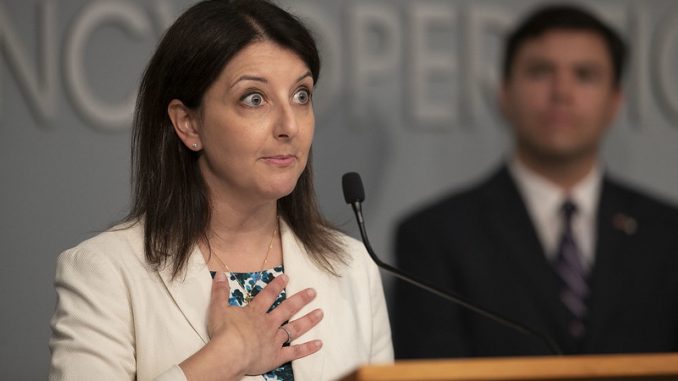
RALEIGH — On Thursday June 11, Congressman Dr. Greg Murphy (R-03) highlighted concerns voiced by White House Coronavirus Response Coordinator Dr. Deborah Birx about North Carolina’s rising metrics and N.C. Department of Health and Human Services (NCDHHS) data transparency issues.
Birx’s concerns were brought up during a briefing on Monday by Governor Roy Cooper, who said that Birx had contacted NCDHHS Secretary Mandy Cohen about some of the state’s rising COVID-19 metrics as well as concerns about the state’s sluggish COVID-19 testing response to outbreaks.
Murphy, speaking at the Republican Party offices in Raleigh, said he was not there to cast blame or point fingers, but there were a number of missed opportunities that could have put the state on a better track. He also wanted to highlight that certain aspects of the science and data have been overlooked.
During his remarks, Murphy went through a number of the state’s reporting metrics and outlined four “C’s” that need to happen going forward which include coherent plans for testing, communication and transparency, consistency in regulation, and collaboration.
“There have been many opportunities to seek consensus in communications that we’ve missed,” said Murphy. “I think if we show some consistency in doing that moving forward, we will be in a much better place.”
As of June 11, North Carolina has completed 572,677 tests with 39,481 positive cases. The state’s record for the largest one-day jump in new cases remains 1,370, which occurred on Saturday, June 6. The hospitalization total is currently 812, up from 780 the previous day.
The deaths associated with COVID-19 stand at 1,064. The majority of deaths in the state 642 or 60% of all deaths to date are attributed to nursing home and assisted living facilities. The record for highest number of deaths in one day was 27 on May 25.
Murphy said that the state really needs to have a plan for protecting those congregate facilities.
“Those are the hot spots where people have succumbed to this disease,” said Murphy. He added that the populations of those facilities are individuals who are already sick and very frail, with about half living for only about six months once placed in a nursing facility.
In briefings this week, Cohen has tied an increase in positives and hospitalizations back to reopening activities, but White House Coronavirus Task Force officials said that North Carolina’s reporting issues were going on long before reopening began.
Murphy said that in his conversations with Birx, she said that in the case of North Carolina there was “some kind of systemic flaw” that had led the state to have a “defined slope in the number of cases” that goes back to the start of the pandemic.
Referring to Birx, Murphy said she was “very emphatic” that the rise in metrics “did not have to do with reopening the state.” He elaborated and said there is “some intervention that we have not done” that has led to our persistent rise in cases when compared to other neighboring states.
It is unclear what intervention is missing and Murphy said it was important that North Carolina be looking at what other states have done. He did say that he believed the state did not “clamp down” on nursing home facilities soon enough.
In her call with Birx, Cohen said that North Carolina counties with troubling metrics include Alamance, Durham, Duplin, Forsyth, Lee, Johnston Mecklenburg, and Wake. Cohen indicated the state would be “surge testing” in those areas.
Murphy had pointed out that North Carolina has not engaged in the kind of testing it needs to be in order to react to outbreaks. He said that the state should be using local resources or institutions which already established in our state, such as Vidant or Atrium Health, who have “swarm teams’ that could be doing surveillance testing.
The only surveillance initiated by Cohen has been some of the same systems used to track influenza and other seasonal respiratory illnesses known as the North Carolina Disease Event Tracking and Epidemiologic Collection Tool (NC DETECT).
During a June 10 hearing at the state legislature, Cohen called this surveillance which tracks the number of people coming to emergency rooms or health centers with COVID-like symptoms an “early warning system.” During that hearing, Cohen said the numbers were “largely decreasing” over time since March 21. She also pushed the need to “hammer home” the need to wear face coverings.
At the end of the press conference, Murphy was asked about children possibly having to wear masks in schools. He said the science is “very clear” that wearing a mask reduces transmission to other people.
“I know people don’t like wearing one, but if people are going to be in a congregate setting with a large number of individuals for a sustained period of time, I believe people should wear masks,” said Murphy. He added that he did not believe that it should be state law that mandates wearing a mask.



